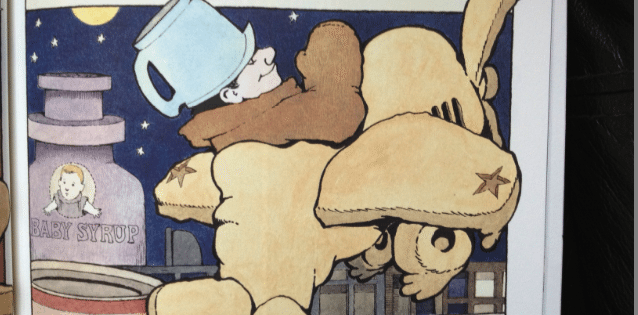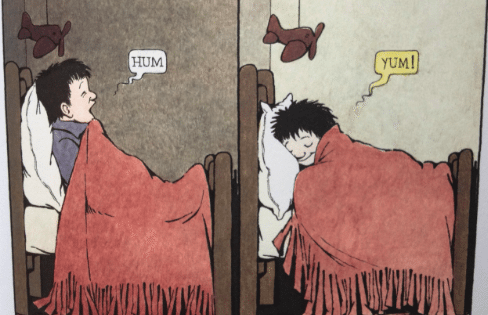I ran out and bought this book the other day:
In the Night Kitchen was one of my childhood favourites and when I heard that Maurice Sendak died, I popped by the local bookseller and snapped up the last copy.
It’s a dreamy and hallucinatory story, just like Where the Wild Things Are, his most famous work. My three daughters love it. Especially the bits where Mickey yells “Quiet down there!!!” and where they see his bare butt.
Read Also

Trump’s trade policies take their toll on Canadian producers
U.S. trade policy as dictated by president Donald Trump is hurting Canadian farmers in a multitude of ways.
Sendak’s basic setup in his stories is that a cocksure and defiant boy either gets in trouble or is bored whilst stuck in his bedroom, and then – wonderfully – his room transforms into Another Place and he has to deal with a more exciting fantasyland that initially seems exciting and beguiling, but in the end leaves him yearning for his comfy home.
Reading it again last night to my three girls made me think immediately of currency exchange issues and agricultural risk management. No doubt you see the connection.
No . . . well maybe it’s just an Ed thing. But I keep thinking of Greece, the Euro, the Loonie and the Greenback as I read In The Night Kitchen, and imagined Mickey as a stand-in for Greece. Sendak’s stories are disengagingly lighthearted, but if you peer beneath the surface there’s a lot of nightmarish scariness, and the later is what Greeks are living through now.
Until three years ago they lived in a relative happyland, where everyone had a job, no one bothered to pay taxes, if you couldn’t handle private sector rigous you could join the 42 percent of the workforce in government service and do less – and everyone got to retire at the age of 20. Well, that’s all a bit of an exaggeration, but in general Greece was functional and seemed to be working as well as Canada, without the pressures of paying tax and having to work to a reasonable retirement age.
Then all of a sudden Greece fell out of its boring and comfortable bed.
Well, that was alarming! When the hapless socialist party came into power they found the previous conservative government had been cooking the books for years, and there was nothing left on the shelves. Greece was bankrupt, on top of all its myriad structural problems, and it went into an economic freefall. Due to general Eurozone weirdness-of-thinking, and due to the Greeks’ own understandable mistrust of themselves having control of a currency, the obvious (to me, anyway) response of pulling out of the Euro currency, defaulting on all the debt, and depreciating Greece into a semi-competitive economy wasn’t considered. For two years. Unbelievably. (I have often, for two and a half years now, discussed with a financial industry colleague why it is that Eurotypes repeatedly vow, in tones oozing of confidence and Euroblaseness, that anyone ever leaving the Euro is an impossibility and that all of this little bother can be wiped away by Eurozone bureaucrats and French-German summits. The ZedMo – I have given him a pseudonym to protect him from the danger of being in any way connected to a wacko like me – just laughs and notes that Europeans think they can talk any problem away, and their bureaucrats and politicians think they can make complex backroom deals that will sort things out in a manner complex enough that the public will never know how it all worked out.)
The response of the two main Greek political parties for the past couple of years was to cling desperately to the Euro and to the hopes that the Germans would pay out the debt. Which they have partially done. But only partially.
Now the Greek population has decided they’ve been getting cooked in a Teutonic oven, and they are beginning to want out.
So the Greeks recently voted for a combo of Communists, Neo-Nazi types and the boring old parties and now have a Parliament less workable than Italy’s – a stunning achievement – and no government. I don’t share many opinions with commies and Nazis, but I do share the view that a combination of deflation, depression, unemployment and decay isn’t likely to lead to a better, stronger, healthier Greece. So maybe they’ll finally chuck the Euro and get real about their problems. Hopefully they can keep control of the commies and Nazis as they do this.
That’s where we get affected. Greece leaving the Euro – now finally accepted by Europols and Eurobureaus as a strong possibility – could leave to the general unravelling of the world’s second great currency, with Portugal, Ireland, Spain and Italy in line to possibly eventually drop out of the Euro. Then France gets in trouble and might have to bail. And the Euro would be just really the new Mark for Germany and a few buddies. So we’d end up with all these new currencies, like the New Drachma, and the Euro or Mark shooting up in value until the German economy went into recession, and a general freakin’ mess.
Then we’ll have just one world currency again – the U.S. Greenback. It’ll be just like 14 years ago, when there was no Euro and jailbaity Britney Spears was still recording Baby One More Time.
But there would be an intense period of currency volatility, and who the heck knows what that would mean for the Greenback, the Loonie, commodity prices, etc.? It could be chaotic.
That means something for farmers, because most Canadian farmers in one way or another deal with prices delineated in both Loonies and Greenbacks. There’s a chance for locked-in prices to go way out of whack and for U.S. futures-based prices to move in unpredictable ways.
So if you’re one of those farmers so affected by the whole Greenback-Loonie relationship, you might see a lot of impact from what happens to the Euro on your prices. One way or the other. You can hedge for that exposure, but do you?
The Greeks are probably hoping – by voting for commies and Nazis – that they can find some unlikely but radical way to fly out of their present predicament.
And they’ll find out that after this long nightmarish journey into a frightening world, they fall back into their comfy old bed and be able to wake up back in the boring old home they were very used to.
That almost certainly won’t happen, with them more likely ending up on a bed of nails. But even the Greeks can dream. Let’s just hope we’re awake to the foreign exchange risks we might face.
By the way, want some proof that currency volatility really does affect the prices of goods for Canadians?
I peeled off the price sticker from the copy of In The Night Kitchen I bought the other day. Here’s what I saw:
The original price was $7.95 in the U.S. and $10.50 in Canada. The sticker placed atop the printed price is now $8.99 “in Canada.” I assume the manual change has something to do with our stronger Loonie. I was on the right side of this trade, since the book was printed before the Loonie rose in value and ended up causing the bookseller to reduce the price. Which way will your ag commodity move? Your guess.
(A note on the beautifully shot and rendered photos with this post: they are all iPhone pix of my personal copy of In The Night Kitchen by Maurice Sendak. Go buy it if you have kids or grandkids.)





















